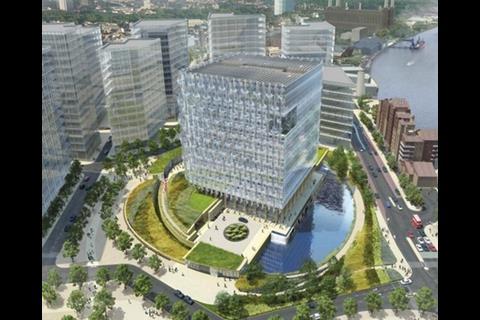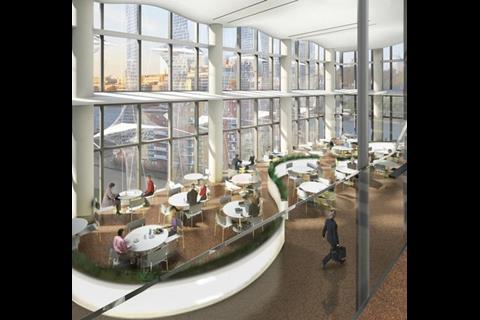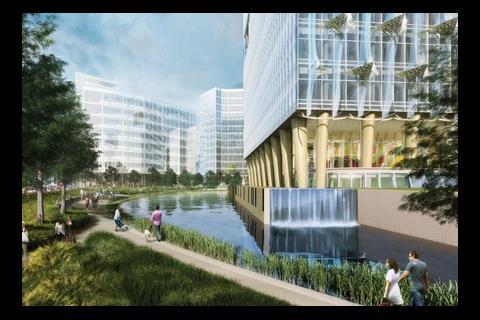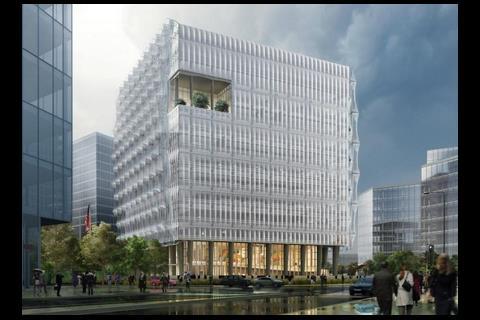America is about to build a £330m embassy in south-west London and it wants British firms to do the lion’s share of the work
‘It’s principally an office building,” says the still-beaming architect, of the scheme he has just won. Well, that’s one way of describing it, but with respect to Timberlake, the co-founder of US practice Kieran Timberlake, it’s just a little bit more than that. It is also, for example, the US government’s planned new embassy to the Court of St James. And it’s worth something like £330m. And the client wants it to be a London icon. And most design competition winners don’t have their moment of triumph televised …
The US government wants the embassy, which will be built at Nine Elms in Vauxhall, to open in 2017. Construction work will begin in 2013 and one thing that we know for sure is that the main contractor, like the architect, will be a US firm – that’s a State Department rule. But Jerry Withers, the department’s man in charge of getting the job done, says most of the actual building work will go to UK firms.
Withers is the project manager for the department’s Overseas Buildings Operations, the body within the State Department that carries out work on diplomatic facilities and embassies across the globe. He says: “I’d be shocked if big UK firms weren’t already interested. The project will create lots of jobs and the bulk of the work will go to local firms.”
He says that UK firms could carry out as much as 90% of the work, and even though the start date is so distant, he reckons the winning American contractor could be appointed later this year. The reason is that his department is looking into the possibility of letting the job as a US version of the Highways Agency’s early contractor involvement schemes.
Under US rules, a contractor is appointed when 35% of the detailed design is complete. Withers says: “Doing it this way would give us quality control, cost control and buildability.”
That means that contractors can rest assured that they will not have to accommodate endless variations when the job gets to site. “We’re not napkin sketch guys,” says Timberlake. “There will be some changes, but the final design will be very similar to what you see now.”
Despite some remarks that the design looks like a big ice cube, Withers is pleased with Timberlake’s work. He says it combines good design with the usual needs of a US embassy abroad. These “needs” largely boil down to security. “Unfortunately, in the world we live in we have to create a secure facility. But we didn’t want something intimidatory. We wanted the antithesis of ‘Fortress America’.”
And this is where the main UK/US work divide comes. He expects the contracts that will make up the fabric of the building, such as the cladding, the piling and the frame will go to UK subcontractors; the more sensitive areas of IT and the M&E will be reserved for US companies that have the requisite security clearance.
To get this work, David Vivian, chief of the architectural engineering branch of the State Department, suggested that UK firms should approach American groups that have built embassies in the past, or other major US firms that may be interested in the project.
Of course, just what constitutes a British firm is somewhat blurred these days: two that have already expressed interest in the work are Bovis Lend Lease and Brookfield, which are Australian-owned. “We’re looking at it,” says Ashley Muldoon, Brookfield’s executive director for Europe. “We’re doing 85 million ft2 in North America so we have routes into the US.” He thinks there is a good chance that the winning US firm will be on the hunt for a local partner. “The US firm can get the contract and the clearance while the UK firm has the local experience.”
One subcontractor that is definitely interested, and not afraid to go down the joint venture route, is Keltbray, the demolition and groundworks specialist. “I think there’s a very good chance of the winner teaming up with a local contractor,” says Brendan Kerr, its group chief executive. “We’d be interested. We’ve worked with Bechtel several times but if we didn’t know the firm that won it we’d be making representations to them.”
Withers says the winning US contractor will be required to set up an office over here – in other words it won’t be managed remotely. “This is only the beginning, there’s a lot of work to be done,” he adds. “There’s going to be a very elaborative consultation process in the next two years.”
And despite the fact that the contractor will be American, there will be lots of involvement from interested parties in the UK before things start on site. The consultation process will include speaking to London mayor Boris Johnson, English Heritage, Cabe and local residents. It will also include speaking to Ballymore, the Irish developer of the Nine Elms site, from which it bought the five-acre parcel of land where the embassy will sit.
Richard Probert is Ballymore’s senior development manager, and he is pleased the design doesn’t resemble a fortress – which would be a problem for it, as it is trying to market a site with another 15 acres and 1,800 residential units. Probert is keen to make sure the front of the building – nicknamed “Embassy Square” – remains a civic focal point. “I don’t want to see a load of Starbucks in there,” he says. “We need proper amenities for residents.”
He thinks the design will stay largely true to the one unveiled last week. “I think the planning authority [Wandsworth council] will have a big problem overturning the final results of a design competition. I suspect there will be some change but I think we can expect it to be still predominantly square and glazed.”
And if the State Department’s men are true to their word, most of it will be built by British firms …
Original print headline - Us and you































No comments yet